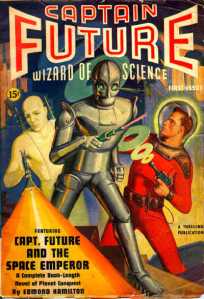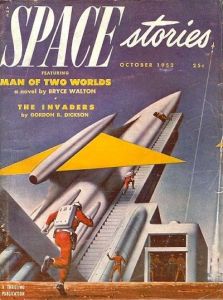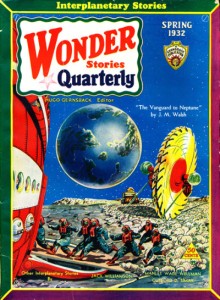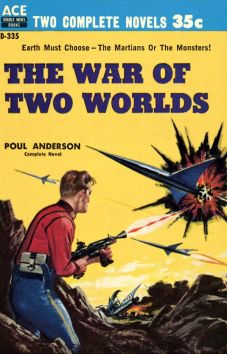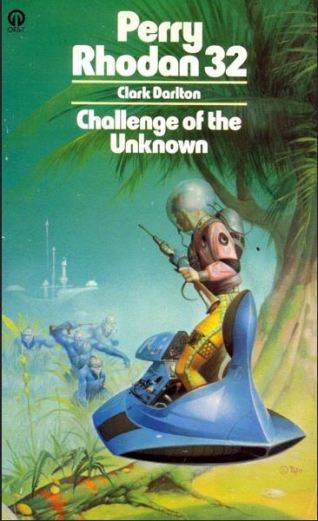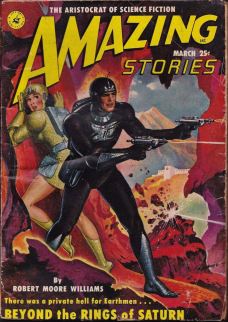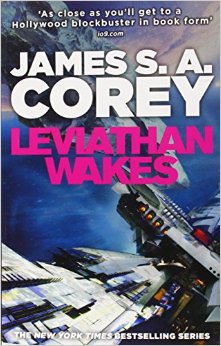
 It’s ironic if not poetic justice, or license depending on how you feel about it, that a term which was spawned to deride a certain type of literature came to be championed decades later as an opportune way to describing a particular subgenre of Science Fiction by Publishers and authors alike to help market it to bookshops, fans, not to mention the general public at large. These days the lines kind of blur between encompassing a greater part of Science Fiction, to those that would try and narrow its meaning as well as audience to something more precise like coming under mostly Military SF. Perhaps its like that episode in the excellent story arc of Babylon 5 where the Vorlon, Kosh reveals himself to the residents of the station in an effort to save Sheridan. Each see a different projection of Kosh manifested in their own belief system of their respective culture’s deities. In other words – each to their own. So I thought, given the current wave of book titles and new TV shows, it might be a fortuitous moment to ask a number of published authors in this field, who either embrace the term or not, what their thoughts are on Space Opera as a whole, and what it might mean today and its relevancy within the Science Fiction community.
It’s ironic if not poetic justice, or license depending on how you feel about it, that a term which was spawned to deride a certain type of literature came to be championed decades later as an opportune way to describing a particular subgenre of Science Fiction by Publishers and authors alike to help market it to bookshops, fans, not to mention the general public at large. These days the lines kind of blur between encompassing a greater part of Science Fiction, to those that would try and narrow its meaning as well as audience to something more precise like coming under mostly Military SF. Perhaps its like that episode in the excellent story arc of Babylon 5 where the Vorlon, Kosh reveals himself to the residents of the station in an effort to save Sheridan. Each see a different projection of Kosh manifested in their own belief system of their respective culture’s deities. In other words – each to their own. So I thought, given the current wave of book titles and new TV shows, it might be a fortuitous moment to ask a number of published authors in this field, who either embrace the term or not, what their thoughts are on Space Opera as a whole, and what it might mean today and its relevancy within the Science Fiction community. ![]()

 MICHAEL COLBEY Michael Cobley was born in Leicester, England, and has lived in Glasgow, Scotland, for most of his life. He has studied engineering, been a DJ and has an abiding interest in democratic politics. His previous books include the Shadowkings dark fantasy trilogy, and Iron Mosaic, a short story collection. Humanity’s Fire sequence are his first full-length foray into space opera which include so far the following books in order, Seeds of Earth [March 2009], The Orphaned Worlds [April 2010], and The Ascendant Stars [November 2011]. Orbit will be releasing Mike’s next novel in the Humanity’s Fire series, Ancestral Machines January 12 2016.
MICHAEL COLBEY Michael Cobley was born in Leicester, England, and has lived in Glasgow, Scotland, for most of his life. He has studied engineering, been a DJ and has an abiding interest in democratic politics. His previous books include the Shadowkings dark fantasy trilogy, and Iron Mosaic, a short story collection. Humanity’s Fire sequence are his first full-length foray into space opera which include so far the following books in order, Seeds of Earth [March 2009], The Orphaned Worlds [April 2010], and The Ascendant Stars [November 2011]. Orbit will be releasing Mike’s next novel in the Humanity’s Fire series, Ancestral Machines January 12 2016.


Mike’s website: http://www.michaelcobley.com/
Facebook: https://www.facebook.com/mike.cobley.scifi?fref=ts ![]()
 DAVE BARA He began to read science fiction voraciously in his teens, with authors like Isaac Asimov, Arthur C. Clarke, Frederick Pohl, Larry Niven, Jerry Pournelle, Gordon Dickson, and Joe Haldeman being among his favorites. This led him to try his hand at writing, which he continued all through his college years, even using a novel project as part of his undergraduate degree studies. During these years the story concepts for what would become The Lightship Chronicles series began to take form. Dave’s writing is influenced by the many SF novels he has read over the years, but most notable were books like Dune (Herbert), The Mote In God’s Eye (Niven and Pournelle), Dorsai! (Dickson), The Forever War (Haldeman), Tau Zero (Poul Anderson) and the Foundation novels (Asimov), among many others. Dave looks forward to bringing SF fans many years of exciting and interesting writing, heroic characters, and soaring adventure in the years to come. IMPULSE: The Lightship Chronicles, Volume I was released in February 3, 2015 from DAW Books in the US and Del Rey Books in the UK and Europe. STARBOUND, The Lightship Chronicles, Volume II should be coming later in February 2016 [most of this information was extracted from GOODREADS]
DAVE BARA He began to read science fiction voraciously in his teens, with authors like Isaac Asimov, Arthur C. Clarke, Frederick Pohl, Larry Niven, Jerry Pournelle, Gordon Dickson, and Joe Haldeman being among his favorites. This led him to try his hand at writing, which he continued all through his college years, even using a novel project as part of his undergraduate degree studies. During these years the story concepts for what would become The Lightship Chronicles series began to take form. Dave’s writing is influenced by the many SF novels he has read over the years, but most notable were books like Dune (Herbert), The Mote In God’s Eye (Niven and Pournelle), Dorsai! (Dickson), The Forever War (Haldeman), Tau Zero (Poul Anderson) and the Foundation novels (Asimov), among many others. Dave looks forward to bringing SF fans many years of exciting and interesting writing, heroic characters, and soaring adventure in the years to come. IMPULSE: The Lightship Chronicles, Volume I was released in February 3, 2015 from DAW Books in the US and Del Rey Books in the UK and Europe. STARBOUND, The Lightship Chronicles, Volume II should be coming later in February 2016 [most of this information was extracted from GOODREADS]
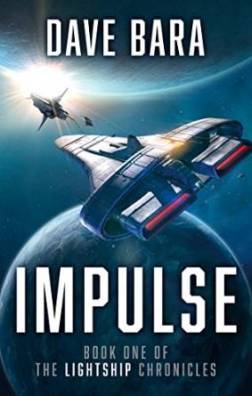
Dave’s Website: http://davebara.blogspot.co.nz/
Facebook: https://www.facebook.com/profile.php?id=100005686935623&fref=ts Twitter: https://twitter.com/davebaraauthor ![]()
 JACK MCDEVITT Jack’s first novel, ‘The Hercules Text’ won the Philip K. Dick special Citation Award in 1986. The Engines Of God was an Arthur C Clarke Award finalist. Ancient Shores was a finalist in the Nebular Awards in 1986. He has release twenty novels with most being in The Academy Series (Priscilla “Hutch” Hutchins and Alex Benedict). His next book, Coming Home (part of the Alex Benedict series) will be released November 4 2014. Jack has written many short stories since 1981. This year Jack received the Robert A. Heinlein Award “for outstanding published works in science fiction and technical writings to inspire the human exploration of space.” ‘Thunderbird‘ (a continuation of an earlier novel ‘Ancient Shores‘ will be released by Ace, December 1, 2015.
JACK MCDEVITT Jack’s first novel, ‘The Hercules Text’ won the Philip K. Dick special Citation Award in 1986. The Engines Of God was an Arthur C Clarke Award finalist. Ancient Shores was a finalist in the Nebular Awards in 1986. He has release twenty novels with most being in The Academy Series (Priscilla “Hutch” Hutchins and Alex Benedict). His next book, Coming Home (part of the Alex Benedict series) will be released November 4 2014. Jack has written many short stories since 1981. This year Jack received the Robert A. Heinlein Award “for outstanding published works in science fiction and technical writings to inspire the human exploration of space.” ‘Thunderbird‘ (a continuation of an earlier novel ‘Ancient Shores‘ will be released by Ace, December 1, 2015.
AMAZON: http://www.amazon.com/Coming-Home-Alex-Benedict-McDevitt/dp/1472207572/ref=tmm_pap_swatch_0?_encoding=UTF8&sr=&qid=
Jack’s Website: https://www.facebook.com/jackmcdevittbooks?fref=ts
Facebook: https://www.facebook.com/jackmcdevittbooks?fref=ts ![]()
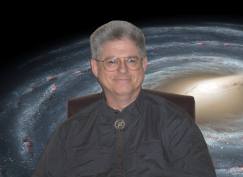 H. PAUL HONSINGER H. Paul Honsinger is the author of the “Man of War” Series, gritty Military Science Fiction novels with an age of sail flavor set in the year 2315. The books follow the adventures of the 28 year old wily Max Robichaux, skipper of the stealthy Penetration and Attack Destroyer USS Cumberland, along with his friend and ship’s Chief Medical Officer, the brilliant Dr. Ibrahim Sahin, during the Earth Union’s interstellar war against the Krag, implacable aliens who believe that their Creator-God has decreed that they must destroy the human race. Two books of the series, originally issued in self-published editions, are now available in new editions from 47North books: To Honor You Call Us and For Honor We Stand. The third volume, Brothers in Valor, which 47North was issued on June 30, 2015. The adventures of Max Robichaux and Ibrahim Sahin will continue in the next series, already begun by Paul, the “Brothers of the Black Sky” Trilogy (tentative title). The planned books in this series are: To Stations My Lads, Our Courage Defiant, and Hearts of Steel. More volumes featuring these characters will follow in an indefinite series.
H. PAUL HONSINGER H. Paul Honsinger is the author of the “Man of War” Series, gritty Military Science Fiction novels with an age of sail flavor set in the year 2315. The books follow the adventures of the 28 year old wily Max Robichaux, skipper of the stealthy Penetration and Attack Destroyer USS Cumberland, along with his friend and ship’s Chief Medical Officer, the brilliant Dr. Ibrahim Sahin, during the Earth Union’s interstellar war against the Krag, implacable aliens who believe that their Creator-God has decreed that they must destroy the human race. Two books of the series, originally issued in self-published editions, are now available in new editions from 47North books: To Honor You Call Us and For Honor We Stand. The third volume, Brothers in Valor, which 47North was issued on June 30, 2015. The adventures of Max Robichaux and Ibrahim Sahin will continue in the next series, already begun by Paul, the “Brothers of the Black Sky” Trilogy (tentative title). The planned books in this series are: To Stations My Lads, Our Courage Defiant, and Hearts of Steel. More volumes featuring these characters will follow in an indefinite series.

Facebook: https://www.facebook.com/hpaul.honsinger?fref=ts
Paul’s Website: http://hpaulhonsinger.com/ ![]()
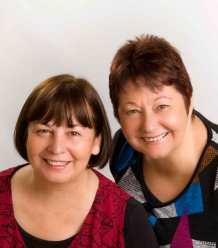
S.K. DUNSTALL S. K. Dunstall is the pen name for Sherylyn and Karen Dunstall, sisters who have been telling stories—and sharing them with each other—all their lives. Around five years ago, they realised the stories they worked on together were much better than the stories they worked on alone. A co-writing partnership was born. Their novel Linesman Book One was released 30 June 2015. Book Two, Alliance will be released by Ace, February 23, 2016. They are currently writing book three in the series.

Facebook: https://www.facebook.com/pages/S-K-Dunstall/1534712296778039?fref=ts
Twitter: https://twitter.com/SKDunstall
S.K. Dunstall’s website: http://www.skdunstall.com/ ![]()
Given how many times the perception of the term Space Opera has been tweaked over the decades to suit, it’s not surprising we all have a slightly different take on its application, so I thought it might be an opportune time to ask five (well six if you’re attentive and counting) authors whose works I think fit well into the spirit of what good Space Opera is with their own respective slant on the subject. Not all agree on whether their own work fits the term, but for some of us as fans and readers, the term fits what we are reading. Enjoy. Please welcome our authors in order of responding below
- Michael Cobley
- Dave Bara
- Jack McDevitt
- H Paul Honsinger
- S.K. Dunstall
![]() MICHAEL COBLEY: Widescreen, interstellar adventures that leap from planet to planet, or dimension to dimension (or both), where the melodrama is high, where the old tropes spring to life in retconned guises, and the drama of character interweaves with the drama of the plot.
MICHAEL COBLEY: Widescreen, interstellar adventures that leap from planet to planet, or dimension to dimension (or both), where the melodrama is high, where the old tropes spring to life in retconned guises, and the drama of character interweaves with the drama of the plot.
DAVE BARA: For me it’s pretty simple; Space Opera takes place primarily in space with the occasional planetfall for variety. The stakes are high, there is usually a menacing antagonist, and it’s a future far from our own. It’s adventure driven rather than science or concept driven. For example, I would classify Star Trek, the new Battlestar Galactica, movies like Forbidden Planet, Star Wars, and Jupiter Ascending as Space Opera. Bladerunner, The Day The Earth Stood Still, Gattaca, and even Interstellar are sci-fi, in my opinion. Then there’s the Miltary SF crossover, which would include Edge of Tomorrow, Starship Troopers, and the like.
JACK MCDEVITT: Space Opera stipulates a narrative that deals with offworld discovery and/or conflict. Unfortunately, it’s become caught up largely in political and military struggles, which miss the essence of what SF should be, the incorporation of a sense of wonder, rather than simply an interstellar shootout.
H PAUL HONSINGER: First, a true confession. When my first book came out in self-publication and people started calling it “Space Opera,” I had to look the term up, as I had no idea what they were talking about. I had some vague notion of the Flash Gordon serials being Space Opera, but that was about it. So, I may be the worst author on the planet to ask for a definition here, but I’ll venture boldly where those with more wisdom would fear to tread. I would think that Space Opera is distinguished from the broader field of SF by the following elements:
1. Scope. The scope of the Space Opera is interstellar, at minimum, and generally sweeps across a large swath of the galaxy, if not the whole galaxy, if not multiple galaxies.
2. Existential consequences. What is at stake in a Space Opera is not merely the career of Lt.Commander Max Robichaux, Union Space Navy, or even that of the destroyer USS Cumberland, but the survival of the human race. At least, the stakes have to be slavery or barbarism or something on that order for at least a whole planet full of people. The good guys MUST win or the consequences are more than anyone can even begin to contemplate.
3. A certain grandness of style. I think a Space Opera writer has to write with a bit of a broader brush and use brighter colors. Big. Bold. Exciting. Subtleties can be in the books, but the books can’t be about subtleties.
 S.K. DUNSTALL: For us, there are six things that make science fiction Space Opera rather than just Sci-Fi: The story is set in space. There is action. The story is character driven. That is, characters are just as important as the science. It usually involves some form of politics, or military, or both. There is often humour. It’s accessible. That is, not a lot of heavy techno-babble. People new to Sci-Fi can understand the story and appreciate it as much as an experienced Sci-Fi reader. Military science fiction isn’t always space opera, especially when it’s more about the fights than about the characters. That old adage—if you point the gun and shoot, then it’s space opera, whereas if you know the make and model and technical specs of the gun when you shoot it, it’s military Sci Fi—holds true for us. Star Wars is classic Space Opera. Galaxy Quest and Guardians of the Galaxy are Space Opera. Old Man’s War is space opera (and military sci-fi). Inception and Annihilation are not.
S.K. DUNSTALL: For us, there are six things that make science fiction Space Opera rather than just Sci-Fi: The story is set in space. There is action. The story is character driven. That is, characters are just as important as the science. It usually involves some form of politics, or military, or both. There is often humour. It’s accessible. That is, not a lot of heavy techno-babble. People new to Sci-Fi can understand the story and appreciate it as much as an experienced Sci-Fi reader. Military science fiction isn’t always space opera, especially when it’s more about the fights than about the characters. That old adage—if you point the gun and shoot, then it’s space opera, whereas if you know the make and model and technical specs of the gun when you shoot it, it’s military Sci Fi—holds true for us. Star Wars is classic Space Opera. Galaxy Quest and Guardians of the Galaxy are Space Opera. Old Man’s War is space opera (and military sci-fi). Inception and Annihilation are not.

![]() MICHAEL COBLEY: Yes, to an extent and for very specific reasons – all subgenre forms tend to go through cycles of being ‘new-and-exciting’ to ‘familiar-and-comfy’ to ‘worn-and-stale’, partially due to the limitations of the writers themselves, but mostly due to the kind of fatigue of meaning that is inherent in commercial culture. Any big successful work gets copied and referenced and sequels are encouraged, with all this repetition the meaning quickly gets leached out and what was once hot and full of urgency becomes stale and flat. The form slips into a fallow period of abeyance, other writers tinker around with the elements, bring in other ways of storytelling etc, and then another breakout book/film/game arrives and off it goes on the upswing again.
MICHAEL COBLEY: Yes, to an extent and for very specific reasons – all subgenre forms tend to go through cycles of being ‘new-and-exciting’ to ‘familiar-and-comfy’ to ‘worn-and-stale’, partially due to the limitations of the writers themselves, but mostly due to the kind of fatigue of meaning that is inherent in commercial culture. Any big successful work gets copied and referenced and sequels are encouraged, with all this repetition the meaning quickly gets leached out and what was once hot and full of urgency becomes stale and flat. The form slips into a fallow period of abeyance, other writers tinker around with the elements, bring in other ways of storytelling etc, and then another breakout book/film/game arrives and off it goes on the upswing again.
 DAVE BARA: Not at all. Some of our most popular films, books, and TV series are Space Opera based. Space Opera shows and tells us how heroes are made. That’s an important distinction in an age of negative dystopian TV shows, movies, and SF literature. Some people may get tired of it, and that’s fine. But it endures because it reaches out to a set of principles that many people embrace, and look for in their own lives.
DAVE BARA: Not at all. Some of our most popular films, books, and TV series are Space Opera based. Space Opera shows and tells us how heroes are made. That’s an important distinction in an age of negative dystopian TV shows, movies, and SF literature. Some people may get tired of it, and that’s fine. But it endures because it reaches out to a set of principles that many people embrace, and look for in their own lives.
![]() JACK MCDEVITT: The criticisms tend to be leveled at individual works rather than at the field as a whole. So accuracy and fairness have to be judged individually.
JACK MCDEVITT: The criticisms tend to be leveled at individual works rather than at the field as a whole. So accuracy and fairness have to be judged individually.
![]() H PAUL HONSINGER: There are books of which these criticisms are true. These criticisms are also true of books in mainstream SF, Fantasy, and even Mystery and Young Adult. People need to wake up and read the newspaper headlines that today, as they have every day since the beginning of the genre, say: GOOD SCIENCE FICTION MUST BE GOOD FICTION. If it is full of tropes, it’s not good fiction, and that goes for the Lensman Series as much as it goes for Rendezvous With Rama. If it is a thinly disguised political tract, it’s not good fiction, either. As movie producer Samuel Goldwyn supposedly said (the quote has also been attributed to Frank Capra, who was much more likeable): “If you want to send a message, use Western Union.” Now, I have no doubt that a great deal of my personal belief system shows in my writing, but I didn’t write these books to sell that belief system. I wrote them to entertain readers and, I hoped, make some money as a result. If your primary goal is entertaining readers, you stand a better chance of having readers who are actually entertained.
H PAUL HONSINGER: There are books of which these criticisms are true. These criticisms are also true of books in mainstream SF, Fantasy, and even Mystery and Young Adult. People need to wake up and read the newspaper headlines that today, as they have every day since the beginning of the genre, say: GOOD SCIENCE FICTION MUST BE GOOD FICTION. If it is full of tropes, it’s not good fiction, and that goes for the Lensman Series as much as it goes for Rendezvous With Rama. If it is a thinly disguised political tract, it’s not good fiction, either. As movie producer Samuel Goldwyn supposedly said (the quote has also been attributed to Frank Capra, who was much more likeable): “If you want to send a message, use Western Union.” Now, I have no doubt that a great deal of my personal belief system shows in my writing, but I didn’t write these books to sell that belief system. I wrote them to entertain readers and, I hoped, make some money as a result. If your primary goal is entertaining readers, you stand a better chance of having readers who are actually entertained.
 S.K. DUNSTALL: Yes, it has had that reputation in the past. There has always been good Space Opera but it has often been overwhelmed. It’s improving. There are still tropes but the same could be applied to an epic fantasy, a whodunit, a western, or an urban fantasy. We’ve gone past a lot of the work that attracted this criticism. Nowadays, the good stuff is good. Look at Anne Leckie’s Ancillary Justice, John Scalzi’s Old Man’s War. Vernor Vinge (if you consider A Fire Upon the Deep space opera).
S.K. DUNSTALL: Yes, it has had that reputation in the past. There has always been good Space Opera but it has often been overwhelmed. It’s improving. There are still tropes but the same could be applied to an epic fantasy, a whodunit, a western, or an urban fantasy. We’ve gone past a lot of the work that attracted this criticism. Nowadays, the good stuff is good. Look at Anne Leckie’s Ancillary Justice, John Scalzi’s Old Man’s War. Vernor Vinge (if you consider A Fire Upon the Deep space opera). 
![]()
MICHAEL COBLEY: I`m proud for my Humanitys Fire books to be known as Space Opera
.  DAVE BARA: Absolutely. My agent likes to call my work ‘Military SF’ and I like to call it Space Opera. To me military SF are these Warhammer type books with extensive detail put into weapons and battle scenes, and they only (usually) deal with aspects of the military life. I want my work to be broader than that, with adventure, character development, a bit of romance, and political intrigue all mixed in. That to me is Space Opera.
DAVE BARA: Absolutely. My agent likes to call my work ‘Military SF’ and I like to call it Space Opera. To me military SF are these Warhammer type books with extensive detail put into weapons and battle scenes, and they only (usually) deal with aspects of the military life. I want my work to be broader than that, with adventure, character development, a bit of romance, and political intrigue all mixed in. That to me is Space Opera.
![]() JACK MCDEVITT: Not particularly. The term derives from soap opera, of course, which tended to be repetitive domestic struggles delivered with little, if any, imagination.
JACK MCDEVITT: Not particularly. The term derives from soap opera, of course, which tended to be repetitive domestic struggles delivered with little, if any, imagination.
![]() H PAUL HONSINGER: I’m happy if they label it “Assorted Chicken Parts” as long as people enjoy it and continue to buy more. The label I like the most for my work is Space Naval Fiction, but no one else uses that term, so I’m wasting my breath trying to get people to use it for my work. My books show up on Amazon bestseller lists for Space Opera and Military Science Fiction, as well as War Fiction and Military Adventure Fiction outside of the Science Fiction Category. I really think my work can be categorized as easily with that of Patrick O’Brian as with that of David Weber. So, there are lots of labels that apply here and I’m very happy that “Space Opera” is one of them. I certainly DO try to write Big Stories Told in a Big Way. I meant those caps.
H PAUL HONSINGER: I’m happy if they label it “Assorted Chicken Parts” as long as people enjoy it and continue to buy more. The label I like the most for my work is Space Naval Fiction, but no one else uses that term, so I’m wasting my breath trying to get people to use it for my work. My books show up on Amazon bestseller lists for Space Opera and Military Science Fiction, as well as War Fiction and Military Adventure Fiction outside of the Science Fiction Category. I really think my work can be categorized as easily with that of Patrick O’Brian as with that of David Weber. So, there are lots of labels that apply here and I’m very happy that “Space Opera” is one of them. I certainly DO try to write Big Stories Told in a Big Way. I meant those caps.
 S.K. DUNSTALL: Very happy to be labelled space opera. We told everyone that’s what it was. We’re proud of that. Space Opera is so much fun. The characters make the story. Add action, humour, adventure, a dash of space, and throw in a few battles. Who could resist? Space opera is visual, full of characters you want to read about and follow.
S.K. DUNSTALL: Very happy to be labelled space opera. We told everyone that’s what it was. We’re proud of that. Space Opera is so much fun. The characters make the story. Add action, humour, adventure, a dash of space, and throw in a few battles. Who could resist? Space opera is visual, full of characters you want to read about and follow.
MICHAEL COBLEY: Some obvious ones, Iain Banks, David Brin, Vernor Vinge, Asimov, and others like John Brunner, David Wingrove, Star Wars (the original trilogy), Firefly, oh, and Andre Norton.
 DAVE BARA: I think the no. 1 influence for me was The Mote In God’s Eye by Niven & Pournelle. I think it’s the greatest Space Opera ever written. Dune was a big influence, with it’s dueling royal houses and such, and I always wanted to know more about how that system worked. The Dorsai books by Gordon Dickson were influential. There are others. Fredrick Pohl, Joe Haldemann, Samuel Delany. I’ve recently been enjoying the Lost Fleet series by John Hemry (AKA Jack Campbell) and the Diving series books by Kris Rusch as well.
DAVE BARA: I think the no. 1 influence for me was The Mote In God’s Eye by Niven & Pournelle. I think it’s the greatest Space Opera ever written. Dune was a big influence, with it’s dueling royal houses and such, and I always wanted to know more about how that system worked. The Dorsai books by Gordon Dickson were influential. There are others. Fredrick Pohl, Joe Haldemann, Samuel Delany. I’ve recently been enjoying the Lost Fleet series by John Hemry (AKA Jack Campbell) and the Diving series books by Kris Rusch as well.
![]() JACK MCDEVITT: Now you’re using the term, Paul. I don’t think of my work that way. But SF writers who have influenced me include Clarke, Asimov, Bradbury, Heinlein, and Benford. I don’t think we’d label their work as space opera.
JACK MCDEVITT: Now you’re using the term, Paul. I don’t think of my work that way. But SF writers who have influenced me include Clarke, Asimov, Bradbury, Heinlein, and Benford. I don’t think we’d label their work as space opera.
![]() H PAUL HONSINGER: Since I never set out to write “Space Opera,” my influences aren’t from that field. In fact, my initial notes for my series say something like: “Man of War Series–Blend [Patrick O’Brian’s] Aubry/Maturin Series, WWII Submarine movies like Run Silent Run Deep and Tom Clancy Technothrillers like Hunt for Red October and, especially, Red Storm Rising and set in a huge interstellar war.” I read huge amounts of Asimov, Clarke, and Heinlein when I was growing up, and truly-deeply loved David Niven’s writer’s voice. That sardonic, cynical yet fun tone he had, especially in stories like “Neutron Star,” was what I wanted to sound like. Except that I also wanted to sound a bit like the narrator in the old “Victory at Sea” documentary series. “The Marines held on. With their guts.” I think that there are both voices in my work, but I’m afraid that I’m more “Victory at Sea” than Larry Niven. I met Larry Niven last week and found him very nice, but surprisingly shy. I’m too loud and obnoxious for him to be comfortable. I wonder if I will make the same impression on Victory at Sea when I meet her. I would wonder if she’s cute but I know she’s a lot older than I am.
H PAUL HONSINGER: Since I never set out to write “Space Opera,” my influences aren’t from that field. In fact, my initial notes for my series say something like: “Man of War Series–Blend [Patrick O’Brian’s] Aubry/Maturin Series, WWII Submarine movies like Run Silent Run Deep and Tom Clancy Technothrillers like Hunt for Red October and, especially, Red Storm Rising and set in a huge interstellar war.” I read huge amounts of Asimov, Clarke, and Heinlein when I was growing up, and truly-deeply loved David Niven’s writer’s voice. That sardonic, cynical yet fun tone he had, especially in stories like “Neutron Star,” was what I wanted to sound like. Except that I also wanted to sound a bit like the narrator in the old “Victory at Sea” documentary series. “The Marines held on. With their guts.” I think that there are both voices in my work, but I’m afraid that I’m more “Victory at Sea” than Larry Niven. I met Larry Niven last week and found him very nice, but surprisingly shy. I’m too loud and obnoxious for him to be comfortable. I wonder if I will make the same impression on Victory at Sea when I meet her. I would wonder if she’s cute but I know she’s a lot older than I am.
 S.K. DUNSTALL: We love space, we love Space Opera, but our influences come from everywhere. We get them from characters we love in stories. Brandon Sanderson’s Kaladin, Sarah Monette’s Mildmay, Alan Grant from Ivan Southall’s Simon Black series, Anne McCaffrey’s Menolly. Plus, from writers we love. Diana Wynne Jones. Robin Hobb, Vernor Vinge, Joan D. Vinge, Connie Willis, Anne Leckie, John Flanagan, Anne Bishop, Sage Blackwood. We could go on. Plus, of course, the movies. Star Wars, Star Trek, Galaxy Quest, Thor. This is by no means a complete list.
S.K. DUNSTALL: We love space, we love Space Opera, but our influences come from everywhere. We get them from characters we love in stories. Brandon Sanderson’s Kaladin, Sarah Monette’s Mildmay, Alan Grant from Ivan Southall’s Simon Black series, Anne McCaffrey’s Menolly. Plus, from writers we love. Diana Wynne Jones. Robin Hobb, Vernor Vinge, Joan D. Vinge, Connie Willis, Anne Leckie, John Flanagan, Anne Bishop, Sage Blackwood. We could go on. Plus, of course, the movies. Star Wars, Star Trek, Galaxy Quest, Thor. This is by no means a complete list.

![]() MICHAEL COBLEY: Oh, I think there’s plenty of room out there on the interstellar canvas for just about any variant of Space Opera to take root and expand – and in the screen and game mediums as well. I think its heading in several directions at the moment, carried by writers on fire with their own peculiar vision, and absent the surprise development of an FTL drive that`ll take us over to Alpha Centauri in a day or two, space opera will continue to be an integral part of Science Fiction gaudy patchwork territory.
MICHAEL COBLEY: Oh, I think there’s plenty of room out there on the interstellar canvas for just about any variant of Space Opera to take root and expand – and in the screen and game mediums as well. I think its heading in several directions at the moment, carried by writers on fire with their own peculiar vision, and absent the surprise development of an FTL drive that`ll take us over to Alpha Centauri in a day or two, space opera will continue to be an integral part of Science Fiction gaudy patchwork territory.
 DAVE BARA: If it was going to die out it would have by now. I think it is evolving, taking on more technical science from SF. If you look at films and TV recently you see a renaissance with the successful Star Trek series reboot, Star Wars: The Force Awakens, Jupiter Ascending, and many others. On TV we’ve got new shows like Killjoys and Dark Matter that are both set in space, so I think we’re in good standing there. SyFy even had to come back to space-based shows because their other offerings were failing. If the new Star Wars movie and spinoffs are as successful as I think they’ll be, you should see a rush of new Space Opera on TV and in the movies soon. Space Opera will never die. It will only change form and grow with the times.
DAVE BARA: If it was going to die out it would have by now. I think it is evolving, taking on more technical science from SF. If you look at films and TV recently you see a renaissance with the successful Star Trek series reboot, Star Wars: The Force Awakens, Jupiter Ascending, and many others. On TV we’ve got new shows like Killjoys and Dark Matter that are both set in space, so I think we’re in good standing there. SyFy even had to come back to space-based shows because their other offerings were failing. If the new Star Wars movie and spinoffs are as successful as I think they’ll be, you should see a rush of new Space Opera on TV and in the movies soon. Space Opera will never die. It will only change form and grow with the times.
![]() JACK MCDEVITT: Narratives about offworld travel, visits to new places, learning more about the universe, will always be a major part of the genre. We’ll never reach a point where we’ll have a solid grasp on everything beyond this planet.
JACK MCDEVITT: Narratives about offworld travel, visits to new places, learning more about the universe, will always be a major part of the genre. We’ll never reach a point where we’ll have a solid grasp on everything beyond this planet.
![]() H PAUL HONSINGER: I’m not worried in the least about the genre dying out. There will always be Science Fiction, and as long as there is SF, there will be people who want to write it but to tell Big Stories in a Big Way. That’s really all that Space Opera is–SF, but with Big Stories told in a Big Way. I have no idea where it will evolve, save that it will go wherever writers are willing to lead and readers are willing to follow. It will wax and wane, but it will never die.
H PAUL HONSINGER: I’m not worried in the least about the genre dying out. There will always be Science Fiction, and as long as there is SF, there will be people who want to write it but to tell Big Stories in a Big Way. That’s really all that Space Opera is–SF, but with Big Stories told in a Big Way. I have no idea where it will evolve, save that it will go wherever writers are willing to lead and readers are willing to follow. It will wax and wane, but it will never die.
 S.K. DUNSTALL: Space Opera is definitely an evolving genre. We believe it will continue. Right now, in fact, it seems to be heading for a resurgence. Movies help—because let’s face it, space opera comes across so well as a movie—and widens the audience for space opera. Can you imagine a world without Star Wars or Galaxy Quest? Its popularity will wax and wane, like any other sub-genre, but space opera is here to stay. Because it’s fun. Because it’s entertaining. And really good space opera does what any other good science fiction does. It makes you think.
S.K. DUNSTALL: Space Opera is definitely an evolving genre. We believe it will continue. Right now, in fact, it seems to be heading for a resurgence. Movies help—because let’s face it, space opera comes across so well as a movie—and widens the audience for space opera. Can you imagine a world without Star Wars or Galaxy Quest? Its popularity will wax and wane, like any other sub-genre, but space opera is here to stay. Because it’s fun. Because it’s entertaining. And really good space opera does what any other good science fiction does. It makes you think. ![]() I can’t believe asking 5 questions could stretch this article to over 3552 words and about 38 revisions over the past few weeks but that’s thanks to a wonderful collection of authors here who gave generously of their time and thoughts. Thank you and all best with your novels and series
I can’t believe asking 5 questions could stretch this article to over 3552 words and about 38 revisions over the past few weeks but that’s thanks to a wonderful collection of authors here who gave generously of their time and thoughts. Thank you and all best with your novels and series
– Paul
progrocker@xtra.co.nz
https://www.facebook.com/paul.watson.71868


















